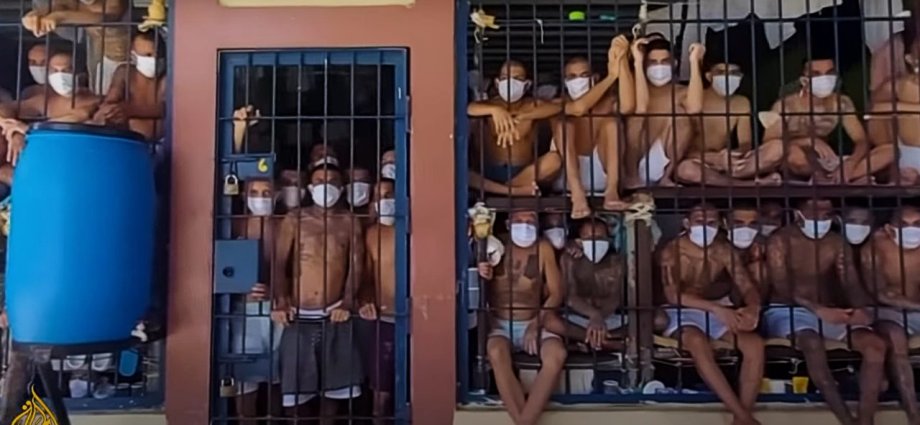Journalists believe the government held secret negotiations with gangs
Screenshot from Al Jazeera news report from September 6, 2020, on YouTube.
After 15 months of governance, it seems that president Nayib Bukele — a 37-year-old politician who put an end to an old two-party system — is delivering on his promise to reduce El Salvador’s legacy of violence and homicides. Since he took office, El Salvador has had the lowest homicide rate since 2015, the deadliest year El Salvador suffered recently. Yet, hypotheses and analyses of how the statistics have dropped are subject to much debate in the country.
President Nayib Bukele attributes the success to his “territorial control plan“. On the other hand, some analysts, journalists, and the political opposition believe that Bukele has a secret truce with gangs to lower homicides and win votes in the next parliamentarian elections in February 2021, as reported in the El Faro newspaper.
Bukele’s territorial control plan consists of seven phases that will be implemented during his term in office. The first three phases are about increasing the presence of security forces on the streets, modernizing the equipment of police forces, and prevention activities for youth at risk. The estimated cost of the security plan’s initial three phases is $575 million. As of today, only phase one and part of phase two have been implemented. Lack of funding is delaying the implementation of phase three.
Phase one of the security plan aims at “taking back control” of the territory controlled by gangs. To accomplish this, the government deployed a large number of soldiers to help the National Police with security and moved high ranking gang members into separate prisons, mixed rival gangs in the same jail cells, and removed all phone devices from the jails.
Autoridades de @CentrosPenales trasladaron a varios reos de alta peligrosidad a cárceles con mayor rigurosidad, con el objetivo que no sigan ordenando delitos. Esta acción es parte del #PlanControlTerritorial implementado por el gobierno, informa @SeguridadSV_. Fotos cortesía. pic.twitter.com/a2yDzCfpaj
— elsalvador.com (@elsalvadorcom) June 21, 2019
Authorities from @CentrosPenales moved several highly dangerous inmates to prisons with greater control, with the aim of stopping them from ordering crimes. This action is part of the #PlanControlTerritorial implemented by the government, reports @SeguridadSV_.
Sofía Martinez, an expert consultant in Central American security, questioned the tactics used by President Bukele, which were already implemented by previous presidents from 2003 to 2018. None of which had given positive results in the past.
The investigative digital newspaper El Faro reported on September 3 that Bukele’s government had secretly negotiated with the largest gang in El Salvador, MS-13, to reduce the number of homicides and receive electoral support. MS-13 is perhaps the most notorious and arguably most violent street gang in the Americas. This gang is firmly established in all 14 departments of El Salvador, both in urban and rural areas.
El Faro asserted that they had hundreds of pages, such as reports and logbooks from maximum-security prisons, as evidence. El Faro wrote:
The documents reveal negotiations between the Salvadoran administration and incarcerated leaders of MS-13 dating back to June of 2019, when President Bukele took office.
El Faro stated that in return for lowering the homicides and getting electoral support in the upcoming elections, MS-13 would receive small prison privileges such as receiving fried chicken, pizza, candy, and pupusas in their gang cell blocks and the removal of aggressive prison guards. Larger benefits would also be at play, such as revoking the decision to mix rival gangs in the same jail cell and “even promising to soften the maximum-security regime, repeal laws, and give gang members ‘benefits’ if the government can take control of the Legislative Assembly in the elections in February 2021,” according to El Faro.
The Bukele administration swiftly responded to El Faro’s allegations by ridiculing its claims on Twitter. Vice Minister of Justice and General Director of Penal Centers Osiris Luna took reporters to all three prisons mentioned in El Faro’s report to show that inmates had no benefits of any kind and that rival gangs were housed in the same jail cell.
The report by El Faro is not the first of its kind that came out indicating the alleged gang truce between the government and gangs. The International Crisis Group wrote an article on July 8 that questioned whether the plunging violence was “a miracle or mirage”.
Furthermore, on October 1, InSightCrime published an investigation on Bukele and gangs that dates back to the time he was mayor of San Salvador. The investigation by InSightCrime focuses on the rehabilitation of the San Salvador Historic District. InSightCrime stipulates that the rehabilitation of the historic district was accomplished by Bukele due to secret negotiations with gangs in the area.
President Bukele has continued to criticize and ridicule El Faro and other media outlets for the reports on his administration. This criticism of El Faro and other media outlets has raised worries among journalists and international observers about freedom of the press in El Salvador. Latin American journalists asked IACHR to act on the president’s attacks in El Salvador in the context of the slandering of El Faro.
President Nayib Bukele denied accusations that he is attacking the press:
“Algunos periodistas dicen que este gobierno ataca a la prensa; nosotros estamos comprometidos con la libertad de expresión, pero algunos pasan publicando una sarta de mentiras y lo que nosotros hacemos es desmentirlos. Eso no es violar la libertad.”
Presidente Nayib Bukele.
“Some journalists say that this government attacks the press; we are committed to freedom of expression, but some go around publishing a string of lies and what we do is deny them. That is not violating freedom.”
President Nayib Bukele.
In 2012, a secret truce to lower the homicide rate was adopted by the ex-president Mauricio Funes administration and both main Salvadoran gangs, MS-13, and 18th Street. The killings dropped in 2012 and 2013, but when the truce fell out, the number of homicides spiked to the infamous 2015 rate of 18.2 daily murders.
Journalist Oscar Martinez fears that this might happen again if there is a secret truce today between the government and the gangs. He encourages the president to openly negotiate with the gangs to restore peace in society. However, Martinez may be in the minority as the vast majority of the population is opposed to negotiations with gangs either in secret or in public according to polls dating from 2014. Those surveyed stated that negotiations give legitimacy to ruthless criminal organizations.
Soon after the El Faro allegations were made public, the Salvadoran General attorney Raul Melara opened an investigation into the alleged secret negotiations.











